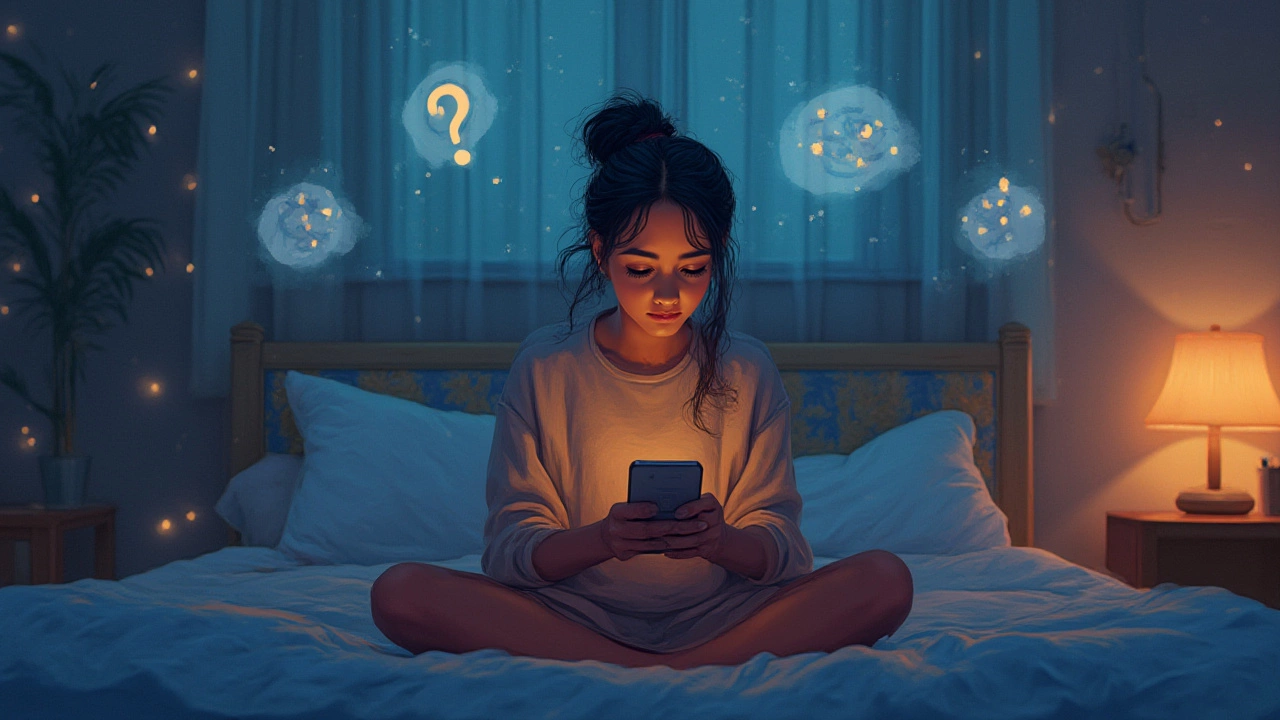It’s 2:00 AM, you’re staring at the ceiling, mind running in circles. Your friends say, “Just take a break” or “Everyone feels like this sometimes.” But deep down, you’re asking, “Is this normal? Or am I supposed to be getting help?” You might even scroll past those Instagram posts about mental health, thinking, “That isn’t for me. Is it?”
Feeling stuck is more common than most people admit. The World Health Organization said in 2024 that nearly 1 in 5 people will face a mental health challenge in their lives. Yet, as much as we Google advice or vent to our group chats, not enough of us know when it’s actually time to talk to a professional. The line between a bad week and a bigger problem can feel blurry. Sometimes, we convince ourselves it’s just stress—because who isn’t stressed these days, right?
But ignoring the signs won’t make them go away. If anything, the pressure keeps building. According to a 2023 survey by the Indian Psychiatry Society, there’s been a 20% rise in mental health issues across urban India, especially since the pandemic. Even after the lockdowns lifted, many people in cities like Pune, Mumbai, and Bengaluru saw lasting changes to their sleep, appetite, or energy. Still, only a small portion got professional help.
Here’s the hard truth—sometimes talking to friends or going for a long walk isn’t enough. And that doesn’t mean you’re weak or broken; it just means you’re human. Therapy isn’t about fixing something “wrong” with you—it’s about understanding what’s happening inside. So, how do you know when it’s time to make that call? Let’s clear up the confusion, bust some myths, and help you figure out if counseling or therapy could actually make life better—not just for you, but maybe for the people around you, too.
What’s the Difference Between Counseling and Therapy?
You hear both words tossed around a lot—sometimes even by professionals. But there are some real differences, and knowing them helps you find what fits.
Counseling is usually about tackling a specific problem or situation. Think breakup blues, job stress, exam pressure, or grieving a loss. It’s often short-term, focused on helping you make practical changes, and developing coping skills for here and now. You set goals, track progress, and usually stop once you feel steadier. Most school or college counselors, or Employee Assistance Programs (EAPs) in offices, offer this kind of support.
Therapy, sometimes called psychotherapy, digs a bit deeper. It’s for when issues stick around, repeat, or just feel too huge for simple fixes. Maybe you have ongoing anxiety, mood swings, problems from childhood, or you feel lost even when “everything looks fine” from the outside. Therapy isn’t one-size-fits-all—it can run for weeks, months, or longer. Different therapists use different approaches (like Cognitive Behavioral Therapy, Dialectical Behavior Therapy, psychodynamic, etc.), but their aim is to help you understand thoughts, feelings, and behaviors so you can live better—not just survive.
Still confused? You’re not alone. Here’s a basic table to help you spot the differences:
| Aspect | Counseling | Therapy |
|---|---|---|
| Focus | Specific problems (e.g. stress, relationships) | Deeper patterns or ongoing issues (e.g. depression, trauma) |
| Duration | Short-term (weeks to months) | Long-term (months to years) |
| Approach | Solution-focused | Explorative and insight-based |
| Provider | Counselor, sometimes with less clinical training | Licensed therapist, psychiatrist, or psychologist |
One thing to remember: in India, terms do overlap and some professionals do both. But knowing what you want—practical help or deeper healing—makes picking the right support easier. Here’s a simple way to think about it: counseling is a torch when you’re lost; therapy is a map for your whole journey.
Still, these definitions aren’t strict boundaries. Many people start with one and move to the other. Don’t get hung up on labels. The important part is that you’re asking the right questions about your needs and what feels helpful for you.

How Do You Know It’s Time to Get Help?
If you had a fever for a few days, you’d see a doctor, right? But when it comes to mental health, a lot of us keep pushing through, hoping things will get better on their own. Indian culture doesn’t make it easy—there’s stigma, rumors about “madness,” and plenty of unhelpful advice on WhatsApp. But pain is pain—mental or physical. Here are some signs that you shouldn’t ignore.
- Constant Overwhelm: It’s not just stress. You wake up tired, can’t focus on work, or small setbacks feel huge. Regular breaks, family time, or your favorite show don’t help.
- Mood Swings: Angry outbursts, sadness that won’t shift, or feeling numb. Your family or friends notice a change—even if you don’t.
- Sleep Drama: Either insomnia or you sleep too much, but never feel rested. If you’re using sleeping pills (prescribed or otherwise) just to function, it’s time to talk.
- Physical Symptoms: Headaches, stomach problems, or constant body pain with no clear medical reason. The mind and body are way more linked than people realize.
- Withdrawing from Life: Skipping work, avoiding friends, hiding from calls or texts, or losing interest in things you loved. Social withdrawal is a classic sign something deeper is going on.
- Unhealthy Coping: If you’re drinking more, smoking, binge-eating, or shopping constantly just to distract yourself, you’re trying to manage pain. Most of us do this, but it’s a flag, not a fix.
- Relationship Struggles: Constant fights, feeling misunderstood, or walking on eggshells around those closest to you.
- Hopelessness: Feeling like nothing will ever improve, no matter what you try. If thoughts of self-harm or suicide pop up—even briefly—reach out now.
Sound familiar? You don’t have to check every box. Even if one or two ring true for a while, it’s reason enough. Waiting for a “rock bottom” moment is risky.
There’s a famous quote from Dr. Vikram Patel, one of India’s most respected mental health experts:
"Mental health is not a destination, but a process. It's about how you drive, not where you're going."If the journey feels rough, you aren’t meant to white-knuckle it alone. People use therapy for all sorts of reasons—breakups, burnout, big life changes, or just learning better ways to cope.
And no, therapy isn’t only for “crazy” or “weak” people. Celebrities, CEOs, and even top cricketers talk openly now about seeing psychologists or counselors. Virat Kohli, in a 2024 interview, spoke about working with a sports psychologist to handle pressure and self-doubt. If therapy can help with World Cup nerves, why not exam stress or work worries?
Still, lots of us wait too long. According to an AIIMS study in 2023, most Indians delay seeking professional help for over a year after first noticing symptoms. By then, small problems have often grown bigger.
Maybe your struggles look different from someone else’s. That’s okay. Your life, your pace. The point is: If things feel heavy, reach out. There’s no award for “suffering in silence.”

How to Start: Tips for Finding Support That Fits
If you’re thinking, “Maybe I should see someone… where do I start?”—you’re already ahead of the curve. Starting is often the hardest part. But with a little guidance, it gets less scary.
First, decide what you need most: a space to vent and solve short-term problems (counseling), or a deep-dive into patterns and life stories (therapy). You don’t need to be 100% sure—just a gut feeling is enough. If you know what’s bothering you (like a breakup or job loss), counseling might help. If emotions seem out of control, or problems keep repeating, therapy could be better.
Ask around. Use trusted websites (like Psychology Today or the Yellow Pages for your city), recommendations from friends who’ve been, or helplines backed by NGOs like iCALL or Snehi. In Pune, several hospitals and clinics now have dedicated mental health wings, and you can book appointments online. Many employers (and even colleges) now offer free or low-cost sessions through EAP schemes—don’t ignore those free sessions your HR emails about!
Here’s a checklist to make things simpler:
- Research: Check the professional’s qualifications. A licensed psychologist, clinical social worker, or psychiatrist is ideal for therapy. For counseling, look for certified counselors with some experience.
- Check Experience: Someone who’s worked with issues like yours—anxiety, grief, relationships, etc.—is a plus.
- Location & Format: In-person is great, but many now offer video or phone sessions. Don’t shy away from online therapy if you’re busy—according to a 2024 study by NIMHANS, online counseling can be as effective as face-to-face for most people.
- Affordability: Rates vary wildly—from Rs. 500 to Rs. 4000 per session in Pune. Some NGOs and government hospitals have sliding scales, so cost needn’t be a deal-breaker.
- Cultural Fit: It helps if your counselor gets your language, religion, or family structure. Don’t be afraid to ask for someone who “gets” your background.
- Trial and Error: It’s normal to try a few people before finding the right fit. This isn’t like swiping on Zomato—what matters is feeling safe, understood, and respected.
Once you’ve found someone, don’t expect miracles overnight. You might feel nervous or awkward at first. Totally normal. Real progress often starts after a few sessions, once you trust the process and yourself. Keep an open mind.
If you’re still worried about what people might think, remember this: According to a 2023 Mental Health Foundation poll, over 70% of young Indians think therapy should be “as routine as seeing a dentist.” The world’s changing, and so are we.
Ready to give it a try? You’ve survived 100% of your worst days so far. Maybe it’s time to find out what life feels like when you get some backup—no drama, no stigma, just honest support.
As the WHO says, "There is no health without mental health." Maybe you don’t need to have it "bad enough" to see a counselor or therapist. You just need to want to feel better than you do right now. And that’s good enough.





